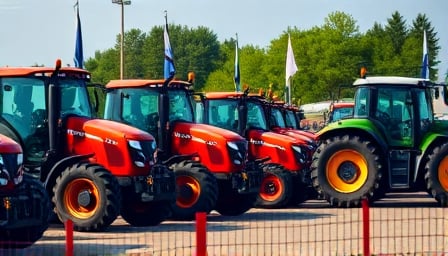Deere & Co. Faces Financial Headwinds Amid Tariff Challenges and Lower Sales
In a challenging quarter for Deere & Co., the agricultural and construction equipment giant reported a significant decline in net income, reflecting broader economic pressures and specific industry challenges. The company’s financial results for the third quarter of 2025, ending July 27, revealed a 26% drop in net income to $1.289 billion, or $4.75 per diluted share, compared to the previous year. This downturn is attributed to a combination of factors, including a noticeable decrease in sales and the impact of tariffs on earnings.
The decline in net income and earnings per share (EPS) from $6.29 to $4.75 marks a concerning trend for Deere & Co., which has historically been a bellwether for the agricultural sector. The company’s revenue also saw a 9% decrease, falling to $10.36 billion. These financial results have led to a downward revision of the company’s full-year guidance, further exacerbating investor concerns.
A significant factor contributing to Deere & Co.’s financial challenges is the impact of tariffs. The company has explicitly linked its lowered guidance to the adverse effects of tariffs, which have increased costs and complicated international trade dynamics. This situation has not only affected Deere & Co. but also reflects broader tensions in global trade that have ripple effects across industries.
The stock market has reacted to these developments, with Deere & Co.’s shares experiencing a notable decline. Following the announcement of the third-quarter results and the revised guidance, the company’s stock fell by 7%, reflecting investor apprehension about the company’s near-term prospects. This decline is part of a broader trend, as the company’s shares have been under pressure, with the close price on August 12, 2025, standing at $513.54, down from a 52-week high of $533.78.
Despite these challenges, Deere & Co. remains a significant player in the machinery industry, with a market capitalization of approximately $139.08 billion. The company’s diverse product range, including equipment for agricultural, construction, forestry, and commercial and consumer use, along with its global presence, positions it to navigate through these turbulent times. However, the current economic environment, characterized by demand weakness and tariff impacts, poses significant hurdles.
As Deere & Co. moves forward, the company will need to address these challenges head-on, potentially by exploring new markets, adjusting its product offerings, or finding ways to mitigate the impact of tariffs. The agricultural and construction equipment sector is highly cyclical and sensitive to economic conditions, making resilience and adaptability key to long-term success.
In conclusion, Deere & Co.’s third-quarter results for 2025 highlight the challenges facing the company and the broader industry. With declining sales, lower profits, and the impact of tariffs, Deere & Co. is at a critical juncture. How the company responds to these challenges will be crucial in determining its future trajectory in the competitive machinery industry.
